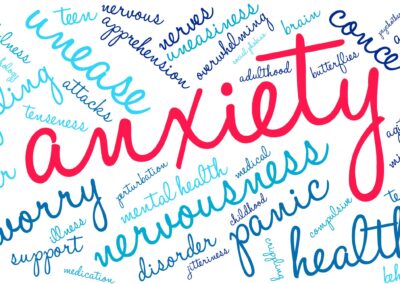Addictions invariably start out with an individual attempting to change or control their mental or emotional state from a less desirable one to a more desirable one. Ironically, in seeking such control, such people become psychologically or physically addicted to the substances (e.g., drugs, alcohol) or behaviors (overeating, sex, work) they’ve enlisted to attain this control. Ultimately, all control over the substance use or behavior is lost.
Anxiety is a mental/emotional state that has attendant physical components. When a person experiences anxiety, there is a release of adrenaline from the adrenal glands that produces a physical “fight or flight” response and mental/emotional discomfort. Research has shown that long term chronic anxiety can even lead to a syndrome called adrenal fatigue, in which the adrenal glands begin to “burn out” from overuse.1
Since anxiety produces mental and emotional discomfort, it is one of the less desirable conditions that individuals often seek to mitigate with substances and/or behaviors to which they ultimately become addicted.
The extent of the anxiety epidemic cannot be overstated. According to the Anxiety and Depression Association of America, anxiety disorders are currently the most common mental illness in the United States, affecting approximately 40 million of those 18 or over every year.2 There has also been an explosion in the incidence of anxiety disorders in teens, preteens and children in recent years.
The “New Normal” of Increased Stress
It is undeniable that we’ve created a society which increasingly gives rise to high levels of stress and, as a result, anxiety. The amount of money spent by individuals and insurance companies on anti-anxiety medications annually is in the billions of dollars, and has risen dramatically as a result of the COVID-19 pandemic. Between March 2019 and March 2020, U.S. prescriptions for anti-anxiety medications jumped from 8.8 million to 9.7 million. During the week ending March 15th, 2020, 78% of all antidepressant, anti-anxiety and anti-insomnia prescriptions filled were for new prescriptions.3
According to the National Institute of Mental Health, approximately 50% of the instances of mental illness are affected by abuse of substances, and out of all people declared mentally unstable, 29% use alcohol or drugs. Further, roughly 37% of alcohol abusers and 53% of drug abusers suffer from at least one mental illness. It is difficult to determine precisely how many of these cases include individuals who were initially trying to self-manage their anxiety, but the anecdotal evidence certainly exists.
There are also scientific studies which show that conventional treatments for stress and anxiety (e.g., anti-anxiety medications) can worsen the problems they are intended to solve. These studies reveal that the use of medications tends to heighten the baseline anxiety level afterward, causing many patients to become addicted to these medications and/or other substances like alcohol and illicit drugs.
BreathConductor™: The Effective Alternative Approach to Treating Anxiety
Individuals in this situation who are discouraged by conventional treatments often find little motivation to find more healthful ways to mitigate their anxiety. The fact is however, that more healthful means do exist.
Breathing is such an essential component to our existence that people have an intuitive understanding of its significance from the very beginning of life. Breathing is not only necessary for survival, but it is also important for maintaining well-being. For thousands of years, practitioners of Eastern disciplines (e.g., Taoism, Hinduism, Buddhism) have employed meditative breathing exercises, considering this to be related to the flow of energy through the body. In recent years, the effectiveness of these practices has been repeatedly corroborated by conventional science.
The basic approach of focused breathing is a slow, deep practice, which is a well-known technique for relaxation, and there is evidence that practicing slow breathing may even increase life spans. The current meditation research emphasizes breathing-based exercises and their direct link to improving overall well-being.
BreathConductor™ by Muvik Labs circumvents the problems associated with conventional therapies for anxiety. By engaging digital solutions, BreathConductor™ configures interventions that are made-to-order for the end user. This generative and adaptive framework is what sets BreathConductor™ apart from other digital therapies.
Science has shown that breath training can both lower rates of immediate stress and increase long-term resilience to stressful stimuli. The paced breathing employed by BreathConductor™ works through physiological and psychological mechanisms to help the user skillfully manage mental and emotional responses to stress. It also helps with managing addiction-related cravings in similar ways.
A drug-free, safe and effective treatment modality, BreathConductor™ achieves maximum benefits in the treatment of anxiety through science-backed breathing AI. Using Muvik’s Precision Respiration infrastructure, practitioners are able to generate their own interventions and curate unique personalized programs for their users within minutes.
1) mayoclinic.org.
Kearns, A. (2022, April 16). Adrenal fatigue: What causes it? Mayo Clinic. Retrieved September 12, 2022, from https://www.mayoclinic.org/diseases-conditions/addisons-disease/expert-answers/adrenal-fatigue/faq-20057906
2) adaa.org.
Facts & Statistics: Anxiety and Depression Association of America, ADAA. Facts & Statistics | Anxiety and Depression Association of America, ADAA. (n.d.). Retrieved September 12, 2022, from https://adaa.org/understanding-anxiety/facts-statistics
3) marketwatch.com.
Pesce, N. L. (2020, May 26). Anti-anxiety medication prescriptions have spiked 34% during the coronavirus pandemic. MarketWatch. Retrieved September 12, 2022, from https://www.marketwatch.com/story/anti-anxiety-medication-prescriptions-have-spiked-34-during-the-coronavirus-pandemic-2020-04-16




